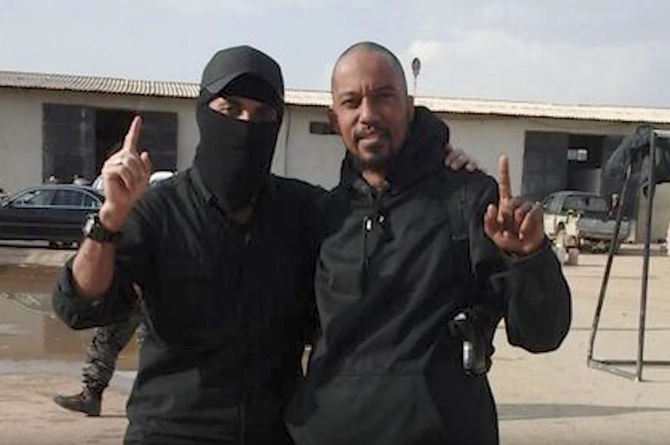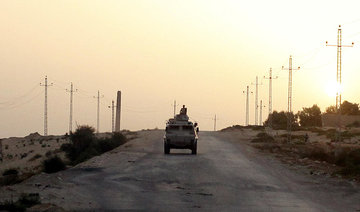WASHINGTON: An FBI translator who was hired to spy on a German member of the Daesh group instead apparently grew attracted to him and snuck off to Syria to get married.
According to court documents seen Tuesday, Daniela Greene, who had a “top secret” security clearance, told her colleagues at the Detroit office of the Federal Bureau of Investigation that she was heading to Germany to see her parents for a few weeks in June 2014.
Instead she flew to Turkey and snuck across the border to meet up and marry a Daesh fighter. He was not identified in the documents, but according to CNN, he was Denis Cuspert, a notorious former German rapper who went by the name of Deso Dogg.
Cuspert was officially designated a terrorist in early 2015 by the US State Department, which described him as a Daesh recruiter focusing on German speakers, and noted that he had appeared in numerous Daesh videos, including on in which he was holding the severed head of a Daesh opponent.
It was not clear how Cuspert, also known as Abu Talha Al-Almani, wooed her. Court testimony suggested they may have communicated privately via a Skype account he used that Greene did not report to her FBI colleagues.
Greene, who was born in Czechoslovakia and married a US soldier, began work at the FBI in 2011, with no problems until her mysterious disappearance in June 2014.
Immediately after her arrival in Syria she married Cuspert, on June 27, 2014, according to court documents recently unsealed. But within days Greene, now 38, began to seek a way out,
“I really made a mess of things this time,” she told a friend in a July 2014 e-mail from Daesh territory.
“I don’t know how long I will last here, but it doesn’t matter, it’s all a little too late,” she said in a subsequent e-mail. In another, she said she recognized she could be imprisoned for years if she returned.
Court documents did not explain how she escaped from Daesh territory, but by early August, less than two months after traveling to Syria, she returned to the United States and was arrested.
She immediately confessed and began cooperating with US prosecutors. Her cooperation “was significant, long-running and substantial,” said an investigator, supporting a lenient sentence.
Ultimately she pleaded guilty to one charge of “making false statements involving international terrorism,” based on what she originally told the FBI about her travel plans. She received a relatively light 24 month prison sentence, and was released last year.
FBI translator married Daesh fighter she spied on
FBI translator married Daesh fighter she spied on

Philippine Vice President Sara Duterte seeks dismissal of impeachment case

- The House of Representatives impeached Duterte in early February on charges of graft, corruption and an alleged assassination plot against one-time ally and former running mate President Ferdinand Marcos Jr
MANILA: Philippine Vice President Sara Duterte responded Monday to her Senate impeachment trial summons, demanding the case against her be dropped.
The House of Representatives impeached Duterte in early February on charges of graft, corruption and an alleged assassination plot against one-time ally and former running mate President Ferdinand Marcos Jr.
A guilty verdict in the Senate would result in her removal from office and permanent disqualification from politics.
A copy of Duterte’s reply to the summons delivered by messenger to House prosecutors on Monday afternoon called the complaint against her an abuse of the impeachment process.
“There are no statements of ultimate facts in the (impeachment complaint). Stripped of its ‘factual’ and legal conclusions, it is nothing more than a scrap of paper,” the response read.
It goes on to deny the allegations made against her as “false” and state that the Senate’s decision to remand the case to the House earlier this month removed her responsibility to answer them.
Duterte is currently on a trip to Australia where she is meeting with Filipino supporters.
Her summons was issued on June 10 after an hours-long Senate session that saw lawmakers convene as an impeachment court only to send the case back to the House, a decision one lawmaker called a “functional dismissal.”
Bangladesh detains Hasina era ex-election chief

- KM Nurul Huda is accused of rigging past polls in favor of former leader
DHAKA: A Bangladesh court on Monday remanded in custody the former elections chief for his alleged role in rigging the vote in favor of now-ousted autocrat Sheikh Hasina.
KM Nurul Huda, 77, was ordered to be detained for four days while questioning continues, a day after a mob who smashed into his home and assaulted him eventually handed him to the police.
On Sunday, the powerful Bangladesh Nationalist Party filed a case against Huda and other former election commissioners it accuses of rigging past polls in favor of Hasina, whose 15 years in power ended in an mass uprising in August 2024.
Interim leader Mohammed Yunus has said elections will be held in early April 2026 — the first in the South Asian nation of around 170 million people since the student-led revolt ousted Hasina.
Police put a helmet on Huda while taking him to the court for protection.
Yunus’s government warned last month that political power struggles risked jeopardizing gains that have been made, saying that holding elections by mid-2026 would give them time to overhaul democratic institutions.
Hasina’s rule saw widespread human rights abuses and her government was accused of politicizing courts and the civil service, as well as staging lopsided elections.
Hasina, 77, remains in self-imposed exile in India, where she fled after she was ousted last year.
She has defied orders to return to Dhaka to face charges amounting to crimes against humanity. Her trial in absentia continues.
UK and Ukraine agree to deepen ties as Zelensky meets Starmer

- Zelensky met with Starmer at his Downing Street home, after earlier visiting King Charles III at Windsor Castle
- The trip comes on the eve of a NATO summit in The Hague, which Zelensky is due to attend
LONDON: Seeking to shore up support more than three years into Russia’s invasion, Ukrainian President Volodymyr Zelensky met UK Prime Minister Keir Starmer during a surprise visit to London on Monday, cementing a military co-production deal.
Zelensky met with Starmer at his Downing Street home, after earlier visiting King Charles III at Windsor Castle.
The trip comes on the eve of a NATO summit in The Hague, which Zelensky is due to attend.
Addressing Ukrainian military personnel undergoing training in the UK, Starmer said the pair had had “an excellent bilateral meeting” and agreed on an “industrial military co-production agreement,” which he called “a massive step forward in the contribution that we can continue to make.”
Zelensky, speaking beside Starmer, insisted the deal “will be very strong and will transform both nations,” although no details were released.
After the meeting, Starmer said it was “really a privilege, a pleasure” to welcome Zelensky, calling him “a regular now at Downing Street.”
Starmer told the Ukrainian troops it was “really humbling” to see their “level of professionalism, commitment and bravery.”
More than 50,000 troops have now been trained as part of the international partnership.
Zelensky said the scheme had helped “strengthen our army” and enabled Ukraine to “survive and fight.”
The UK has been one of Ukraine’s staunchest supporters since Russia invaded in early 2022, levelling rounds of sanctions against Moscow and supplying multiple packages of military aid.
Starmer promised the support would continue “for the rest of the conflict” and help put Ukraine in “the strongest possible position” to negotiate a ceasefire.
Zelensky said his country was “very thankful to the UK... for such big support of Ukraine from the very beginning of this war.”
The Ukrainian leader earlier traveled to Windsor Castle, where he “visited The King... and remained to luncheon,” Buckingham Palace said.
Zelensky is expected at the NATO summit in The Hague on Tuesday and Wednesday, where Ukraine’s allies will work “to ensure that Ukraine is in the best possible position as we go into the next stage of this conflict,” according to Starmer.
NATO allies are poised to take a “quantum leap” by hiking defense spending to counter the threat of Russia, Secretary General Mark Rutte said on the eve of the two-day summit.
The alliance’s 32 members will pledge to boost defense expenditure to five percent of gross domestic product, a key demand of President Donald Trump, who has long grumbled that the US pays too much for NATO.
NATO’s members have thrashed out a compromise deal to dedicate at least 3.5 percent of GDP to core military needs by 2035, and 1.5 percent to broader security-related items like cyber-security and infrastructure.
“The defense investment plan that allies will agree in The Hague introduces a new baseline, five percent of GDP to be invested in defense,” Rutte told reporters at a pre-summit news conference.
“This is a quantum leap that is ambitious, historic and fundamental to securing our future.”
What to know about the Islamic New Year and how Muslims observe it

- Muharram is one of four sacred months during which Islam forbids warfare, a condition that encourages increased prayer, charity and reflection throughout the month
CAIRO: Muslims will soon welcome a new year in the Islamic lunar calendar, known as the Hijri calendar.
The Hijri New Year, beginning on the first day of the month of Muharram, signals a chance for spiritual reflection and religious resolutions, set in the month following the annual Hajj in Makkah, Saudi Arabia.
Here’s what to know about the holiday and how Muslims observe it:
The Hijri New Year will begin around Thursday
This Hijri New Year is expected to fall on or around June 26, ushering in the year 1447 A.H. (which stands for “anno hegirae” or “the year of the Hijrah” in Latin).
The exact date can vary depending on when regional Islamic authorities see the crescent moon.
Because the Hijri calendar is lunar, the dates of Islamic months and holidays — such as Ramadan and Eid Al-Fitr — change annually. The new year corresponds with the first sighting of the crescent moon during Muharram, the first of 12 months in the Hijri calendar.
The calendar began in year 622
The Hijri calendar begins counting from 622 C.E., the year the Prophet Muhammad emigrated from Makkah to Medina, fleeing persecution.
This journey, known as the Hijrah or migration in Arabic, led to the religious, social and political consolidation of the then-nascent Muslim community.
The day is more solemn than festive
Muharram is one of four sacred months during which Islam forbids warfare, a condition that encourages increased prayer, charity and reflection throughout the month. More than 20 countries, including the United Arab Emirates, Morocco and Syria, have designated the Hijri New Year a national holiday.
While the passage of the Islamic New Year is generally more solemn and introspective than festive, Muslims may observe the holiday differently, according to their school of thought.
For Shiite Muslims especially, the first 10 days of Muharram mark a significant period of mourning: On the 10th of Muharram in 680 C.E., the Prophet Muhammad’s grandson Hussein was killed in battle.
Ten days into the new year on Ashoura, waves of Shiite mourners walk the streets dressed in black, beating their chests or self-flagellating in public grief.
Sunni Muslims commemorate Ashoura through voluntary fasting, as the day for them marks Moses’ parting of the Red Sea.
The wars in Iran and Gaza will impact observations of the new year
Mass demonstrations of mourning on Ashoura are known to unfold in Tehran and other cities in the Shiite-majority Iran.
But more than a week into a campaign of strikes by Israel, the streets of Tehran have been largely deserted, businesses are closed, and with no bomb shelters open, many shelter on the floor of metro stations. Thousands have fled the city.
Israel launched a major attack on Iran on June 13, striking the heart of Iran’s nuclear and military structure in Tehran and triggering a war between the two longtime foes.
Ashoura demonstrations in Pakistan, Lebanon and Iraq have also been a site of tributes to Palestinians.
This Hijri New Year is the second to pass since the Israel-Hamas war began in October 2023. Israel’s military offensive in Gaza has since killed more than 55,000 Palestinians in the predominantly Muslim area, according to the Gaza Health Ministry. It does not distinguish between civilians and combatants but has said most of the dead are women and children.
Bangladesh probe into Hasina-era abuses warns ‘impunity’ remains

- Ex-PM Sheikh Hasina’s government was accused of widespread human rights abuses
- That includes extrajudicial killing of political opponents, abduction and disappearances
DHAKA: A Bangladesh government-appointed commission investigating hundreds of disappearances by the security forces under ousted premier Sheikh Hasina on Monday warned that the same “culture of impunity” continues.
The Commission of Inquiry into Enforced Disappearances is probing abuses during the rule of Hasina, whose government was accused of widespread human rights abuses.
That includes the extrajudicial killing of hundreds of political opponents and the unlawful abduction and disappearance of hundreds more.
The commission was established by interim leader, Nobel Peace Prize winner Muhammad Yunus, 84, who is facing intense political pressure as parties jostle for power ahead of elections expected early next year.
Bangladesh has a long history of military coups and the army retains a powerful role.
“Enforced disappearances in Bangladesh were not isolated acts of wrongdoing, but the result of a politicized institutional machinery that condoned, normalized, and often rewarded such crimes,” the commission said, in a section of a report released by the interim government on Monday.
“Alarmingly, this culture of impunity continues even after the regime change on August 5, 2024.”
The commission has verified more than 250 cases of enforced disappearances spanning the 15 years that Hasina’s Awami League was in power.
Commission chief Moyeenul Islam Chowdhury said earlier this month that responsibility lay with individual officers, who were “involved in conducting enforced disappearances,” but not the armed forces as an institution.
Earlier this month, a joint statement by rights groups — including Amnesty International and Human Rights Watch — called on the security forces to “fully cooperate with the commission by guaranteeing unfettered and ongoing access to all detention centers... and providing free access to records regarding those seized or detained.”
Hasina,77, remains in self-imposed exile in India, where she fled after she was ousted last year.
She has defied orders to return to Dhaka to face charges amounting to crimes against humanity. Her trial in absentia continues.




















